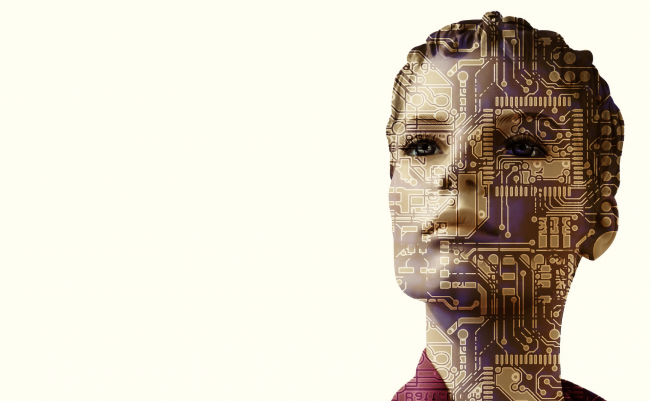
(Spoiler alert: Ex Machina & The Age of Ultron)
What if the internet was a person? This idea, that the internet could have a personality, is a theme that has recently appeared in two big-budget sci-fi film releases over the last little while. We’ve got Ex Machina, a story about the search for artificial intelligence, and The Avengers: The Age of Ultron , where the main villain is an alien AI. But the idea stretches back a fair bit further. Films like Ghost in the Shell, Lawnmower Man, The Matrix and Tron series, as well as the Terminator franchise; books such as the sequels to Orson Scott Card’s Ender’s Game novel; numerous videogames: these all have some sort of personification of something that approximates the internet.
I’d like to just briefly explore some of these themes, as they’re the basis for a current popular understanding of what AI might be like, but also speak to some underlying expectations about the internet (i.e. whether it is ‘good’ or ‘evil’) that probably tie into how regulatory decisions are supported by the population. In other words, my unsubstantiated and unproven theory is that, if you think the internet might end up turning into a world-destroying artificial intelligence in the future, you’re more likely to think that increased regulatory controls need to be instituted in the present.
So what models of this internet-AI do we see in pop culture? There’s basically two positions that get used frequently: the ‘organic consciousness arises out of the internet’ approach, and the ‘pseudo-AI accesses/escapes to the internet’ approach, with most of the other stories sitting somewhere along a spectrum between these two poles.
The ‘Organic consciousness arises out of the internet’ approach
The first case is what has happened in older science fiction, back when the idea of the internet was still thrummed with the concept of cyberspace. The possibility of what the internet might become, and the prospect of it growing and becoming more complex in the future, meant that an idea of self-awareness somehow seemed possible. In the Terminator series, Skynet is a computer system that, after becoming large enough, serendipitously develops intelligence. The same process roughly describes what happens in the Matrix, for the Geth in the Mass Effect games, and Jane from the Orson Scott Card novels. This theme, of a consciousness arising spontaneously out of sufficiently large and complex data, is a plot device that recurs time and time again across much of our science fiction material. The core to the idea is that, given enough information and a means of processing it, a consciousness of some sort can emerge out of the ether. Funnily enough, given the predominant uses of the internet as it currently stands, these identities are not (generally) porn-obsessed, online-shopping, mass-consuming maniacs, but generally are presented as malicious, humanity destroying monstrosities. I think this idea speaks to the way we have trouble knowing what it is on the internet. It riffs on the huge-ness of the internet, and the fact that, while we can make jokes about how ‘the internet is for porn’, it’s actually a really really big big big thing which continues to grow in ways that are really difficult to map. But beyond this, I think it’s also about fears that people have about something internal to our species – some sort of dark uncontained beast lurking at the center of collective human spirit that springs forth when we collect enough of our thoughts together.
The ‘pseudo-AI accesses/escapes to the internet’ approach
The second case is a bit more common recently. It’s less about machines suddenly coming to life, and is more about individual human hubris than it is about our collected spirit. This second model plays on older ideas such as Frankenstein’s Monster, and is often framed around an accident, whereby some sort of restraining system suddenly stops operating properly. The Age of Ultron is one of these cases, whereby an AI developed Tony Stark obtains a pathological curiosity through an alien artefact, and is accidentally released ‘into’ the internet. This in turn leads to a Darwinian desire to usher in an age of robotic posthumanism (contingent, of course, on wiping out humanity). The situation doesn’t end well for the AI – the Avengers beat the shit out of all its robots, and subsume it into the more well-controlled AI, Jarvis.
Ex Machina fits into the second of these cases, with an interesting variation. The main character, Ava, is the product of an algorithm that processes Google-like search requests into personality information, and her capacity to observe, understand, and relate to emotional and affective cues is drawn from facial recognition and voice information drawn directly from global cellphone data. Ex Machina isn’t just an internet consciousness, she’s a security-state consciousness, and it’s perhaps telling that the film resolves with her killing those who try to control her.
Two themes
We can see two things happening in these various personifications of the internet. There’s a theme about the obsolescence of humans as we’re overtaken by the next stage ‘better’ in speciation. There’s the themes which try to draw out a single person from the morass of the internet-based communications. And, there’s the themes about the internet as a wealthy cache of data about us all, which we risk losing if a semi-sentient virus does enough damage. While this is all absolutely fiction, completely reliant on technology for which no real proof exists, the ideas that the internet has a consciousness or an innate ‘good’ or ‘evil’ behaviour does resonate with contemporary narratives about the control of technology. The poorly-understood fears of the menacing-sounding DarkNet feeds into this, and in turn develops easily-understood metaphors that the internet, as a whole, is a bad person that needs to be controlled.
artificial intelligence, film, robots, sci fi